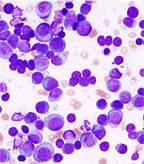Translocations Less Common in African American Men With Multiple Myeloma
African American men with multiple myeloma had a significantly lower frequency of IgH translocations, a signal of nonhyperdiploid multiple myeloma, compared with European American men, according to the results of a new study published in Blood.
African American men with multiple myeloma had a significantly lower frequency of IgH translocations, a signal of nonhyperdiploid multiple myeloma, compared with European American men, according to the results of a new study published in Blood.

Histopathological image of multiple myeloma, smear preparation of bone marrow aspirate stained with May-Grnwald-Giemsa procedure; source: KGH, Wikimedia Commons
“Along with prostate cancer, myeloma is the cancer with greatest difference in incidence between Caucasians and African Americans,” said Rafael Fonseca, MD, chair of the department of medicine at Mayo Clinic, Scottsdale, Arizona.
The reason for this disparity is unknown, but believed to be genetic since the prevalence of the premalignant condition associated with multiple myeloma is also twice as common in African Americans.
“Furthermore, there is now some data that suggests that myeloma has a better prognosis in African Americans as opposed to Caucasians,” Fonseca said. “Therefore, an exploration of possible genetic differences was imperative.”
Fonseca and colleagues analyzed a set of cytogenetic and genomic data from men with multiple myeloma, and compared the frequency of IgH translocations. In addition, the researchers interrogated tumors for somatic copy number abnormalities associated with poor outcome, and investigated patients for transcriptional profiles that are associated with high-risk disease.
Forty percent of African American men had evidence of an IgH translocation compared with 52% of European American men (P = .032). No significant difference between the groups was found for the distribution of translocation partners t(4;14), t(11;14), and t(14;16).
“This finding may explain why myeloma seems to have a more favorable profile among African American men than Caucasians,” Fonseca said.
When the researchers compared the occurrence of hyperdiploid multiple myeloma with nonhyperdiploid multiple myeloma between the two groups, data indicated that they occurred at a similar frequency. In addition, no significant difference of somatic copy number aberrations or difference in the frequency of high-risk disease based on gene expression profiling was found between African American and European American men.
“The study of oncogenetic events can lead to better understanding of genetic susceptibility and causation of disease in specific populations,” Fonseca said. “Other studies like this might shed light into why some diseases behave differently in different populations.”
Navigating AE Management for Cellular Therapy Across Hematologic Cancers
A panel of clinical pharmacists discussed strategies for mitigating toxicities across different multiple myeloma, lymphoma, and leukemia populations.